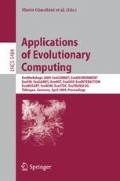Abstract
In the last half-decade, many considerable peer-to-peer protocols have been proposed. They can be grouped in few architectural models, taking into account basically two dimensions: the dispersion degree of information about shared resources (centralized, decentralized, hybrid), and the logical organization (unstructured, structured). On the other side, there is a lack of common understanding about adaptive peer-to-peer sytems. In our view, peers’ internal structure may change in order to adapt to the environment, according to an adaptation plan. To formalize this approach, we propose the Adaptive Evolutionary Framework (AEF). Moreover, we apply it to the problem of sharing consumable resources, such as CPU, RAM, and disk space.
Access this chapter
Tax calculation will be finalised at checkout
Purchases are for personal use only
Preview
Unable to display preview. Download preview PDF.
References
Ahi, E., Caglar, M., Ozkasap, O.: Stepwise Fair-Share Buffering underneath Bio-inspired P2P Data Dissemination. In: 6th International Symposium on Parallel and Distributed Computing (ISPDC 2007), Hagenberg, Austria (2007)
Camazine, S., Deneubourg, J.-L., Franks, N.R., Sneyd, J., Theraulaz, G., Bonabeau, E.: Self-Organization in Biological Systems. Princeton University Press, Princeton (2001)
Agosti, M., Amoretti, M.: Discrete Event Universal Simulator (DEUS), http://code.google.com/p/deus/
Eiben, A.E.: Evolutionary computing and autonomic computing: Shared problems, shared solutions? In: Babaoğlu, Ö., Jelasity, M., Montresor, A., Fetzer, C., Leonardi, S., van Moorsel, A., van Steen, M. (eds.) SELF-STAR 2004. LNCS, vol. 3460, pp. 36–48. Springer, Heidelberg (2005)
Engelbrecht, A.: Computational Intelligence: An Introduction, 2nd edn. Wiley & Sons, Chichester (2007)
Eugster, P.T., Guerraoui, R., Kermarrec, A.-M., Massoulie, L.: From Epidemics to Distributed Computing. IEEE Computer 37(5) (2004)
Gnutella RFC homepage, http://rfc-gnutella.sourceforge.net
Hales, D.: From Selfish Nodes to Cooperative networks - Emergent Link-based incentives in Peer-to-Peer Networks. In: Proc. 4th IEEE Int’l. Conference on Peer-to-Peer Computing (P2P 2004), Zurich, Switzerland (2004)
Heylighen, F.: The Science of Self-organization and Adaptivity. In: Kiel, L.D. (ed.) The Encyclopedia of Life Support Systems (EOLSS). Eolss Publishers, Oxford (2001)
Holland, J.: Adaptation in Natural and Artificial Systems. MIT Press, Cambridge (1992)
Kalyvianki, E., Pratt, I.: Building Adaptive Peer-to-Peer Systems. In: 4th IEEE International Conference on Peer-to-Peer Computing (P2P 2004), Zurich, Switzerland (2004)
Kessler, J., Rasheed, K., Budak Arpinar, I.: Using genetic algorithms to reorganize superpeer structure in peer to peer networks. Applied Intelligence 26(1), 35–52 (2007)
Merz, P., Gorunova, K.: Fault-tolerant Resource Discovery in Peer-to-peer Grids. Journal of Grid Computing 5(3) (2007)
Ottino, J.M.: Engineering complex systems. Nature 427, 399 (2004)
Rowstron, A., Druschel, P.: Pastry: Scalable, decentralized object location, and routing for large-scale peer-to-peer systems. In: Guerraoui, R. (ed.) Middleware 2001. LNCS, vol. 2218, p. 329. Springer, Heidelberg (2001)
Schoder, D., Fischbach, K.: The Peer-to-Peer Paradigm. In: 38th Annual Hawaii International Conference on System Sciences (HICSS 2005), Hawaii, USA (2005)
Tang, J., Zhang, W., Xiao, W., Tang, D., Song, J.: Self-Organizing Service-Oriented Peer Communities. In: International Conference on Internet and Web Applications and Services (ICIW 2006), Guadeloupe, French Caribbean (2006)
Wickramasinghe, W., van Steen, M., Eiben, A.E.: Peer-to-peer evolutionary algorithms with adaptive autonomous selection. In: 9th Annual Conference on Genetic and Evolutionary Computation (GECCO 2007), pp. 1460–1467. ACM Press, New York (2007)
Author information
Authors and Affiliations
Editor information
Editors and Affiliations
Rights and permissions
Copyright information
© 2009 Springer-Verlag Berlin Heidelberg
About this paper
Cite this paper
Amoretti, M. (2009). A Framework for Evolutionary Peer-to-Peer Overlay Schemes. In: Giacobini, M., et al. Applications of Evolutionary Computing. EvoWorkshops 2009. Lecture Notes in Computer Science, vol 5484. Springer, Berlin, Heidelberg. https://doi.org/10.1007/978-3-642-01129-0_7
Download citation
DOI: https://doi.org/10.1007/978-3-642-01129-0_7
Publisher Name: Springer, Berlin, Heidelberg
Print ISBN: 978-3-642-01128-3
Online ISBN: 978-3-642-01129-0
eBook Packages: Computer ScienceComputer Science (R0)

